

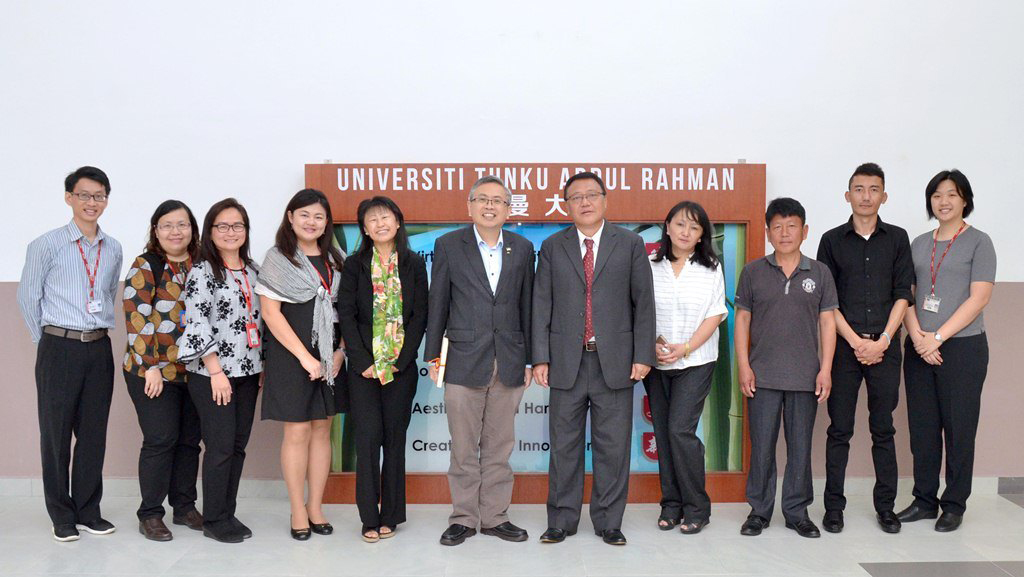
From left: Dr Chen, Er, Dr Ngeow, Dr Wei, Karma Dechen, Prof Ewe, Karma Tshering, Rinzin Wangmo, Dorji Tshewang, Tandin, and Lee
UTAR’s Centre for Learning and Teaching (CLT) hosted a delegation of six officers from Bhutan’s Royal Education Council (REC) and Ministry of Education (MOE) for a four-day exposure tour from 8 to 11 January 2019.
They were Bhutan’s MOE Department of School Education (DSE) Director General Karma Tshering, DSE School Health and Nutrition Division (SHND) Deputy Chief Programme Officer Karma Dechen, Department of Youth and Sports (DYS) Youth Centre Division (YCD) Chief Programme Officer Rinzin Wangmo, DYS YCD Assistant Programme Officer Tandin, REC Unit Head and Curriculum Developer (Social Studies and Early Childhood Care and Development) Dorji Tshewang, and REC Curriculum Developer (Biology) Karma Dorji.
The four-day exposure tour is a programme allowing the delegates to learn about Malaysia’s experience in implementing the comprehensive sexualities education (CSE) curriculum. In doing so, the exposure tour also connected the delegates to local educators and youth leaders via various engagement activities such as interactive learning, discussion, sharing and reflective practices with regard to youth life skills and wellbeing. The programme also served as a platform where the delegates experienced Malaysia’s cultural diversity via youth centre visits, social interaction and youth camp observation.
Receiving the delegation at Sungai Long Campus was UTAR Vice President for Internationalisation and Academic Development Prof Ir Dr Ewe Hong Tat. Also present were UTAR CLT Chairperson Dr Wei Chooi Yi, Programme Coordinator for Science and Technology Programmes Ts Dr Chen Kah Pin, Programme Coordinator for Non-Science and Technology Programmes Dr Ngeow Yeok Meng, Faculty of Accountancy and Management senior lecturer Er Pek Hoon, and Centre for Foundation Studies (CFS) (Sungai Long Campus) assistant lecturer Lee Cin Dee.
Introducing UTAR as a 17-year-old comprehensive not-for-profit private university on its trajectory to be global with transformative societal impact, Prof Ewe also mentioned UTAR’s diverse academic and non-academic programmes, R&D initiatives as well as the UTAR Soft Skills Development Certificate (USSDC), all of which are essential in grooming students to be well-rounded in the advent of the Fourth Industrial Revolution. “With over 300 collaborative partners comprising local and international universities and industry players which have brought about various mutually beneficial exchanges, we are certainly looking forward to the potential collaborations with universities in Bhutan such as students exchange programmes,” added Prof Ewe.
“We’re here to learn about the experience of the Malaysian society in dealing with issues related to health, sex education, and life challenges, particularly among the young generations," explained Karma Tshering, drawing his concern on coping with the fast pace of young people’s life in the Himalayan kingdom with more than 500 schools and three universities. On behalf of the delegation, he also expressed the delight and honour to be visiting UTAR which is one of Malaysia’s leading universities and also picking the brains of some of the very outstanding academics for ideas.

Left pic: Prof Ewe extending his warm welcome to the delegates
Right pic: Karma Tshering thanking UTAR for hosting the exposure tour
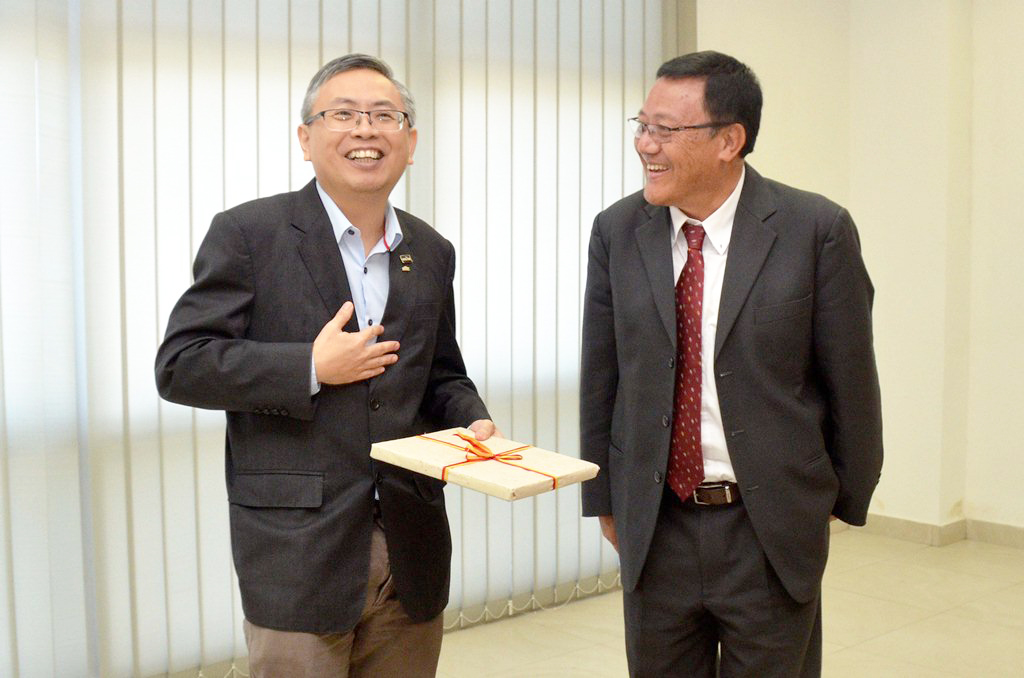
Prof Ewe and Karma Tshering sharing a light moment
The first day at UTAR saw a sharing session by Faculty of Creative Industries (FCI) lecturers, namely Lim Wai Ping Penny, Foo Mei Li and Beh Chun Chee on their ongoing effort to create awareness for endometriosis through their non-for-profit organisation called MyEndosis. The campaign strategies and plan of the five years old movement were shared to give some insights on the alternatives that can be applied in putting a taboo topic, such as menstruation, under the spotlight.
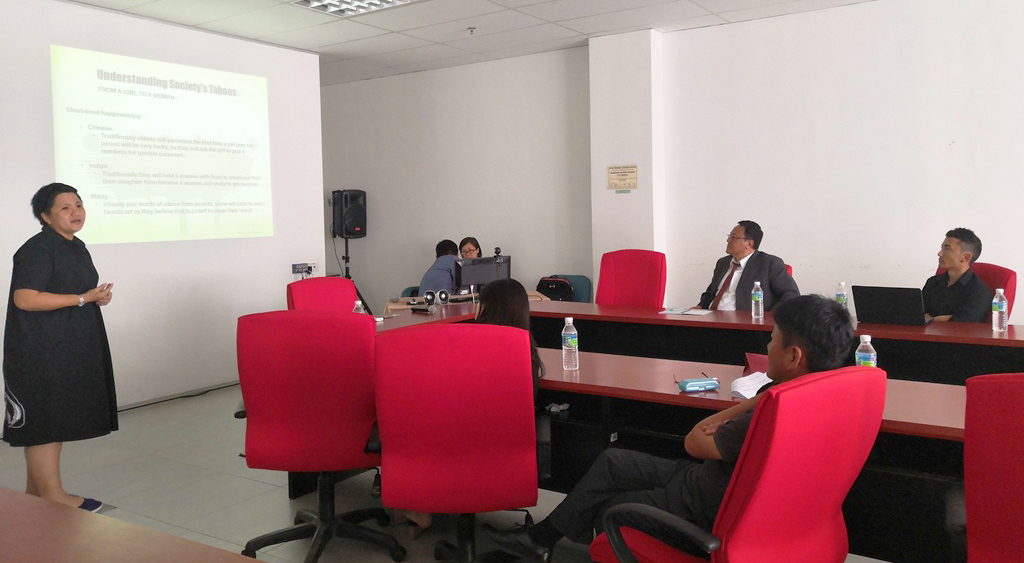
Foo presenting her lecture on taboos and superstitious beliefs in the Malaysian society
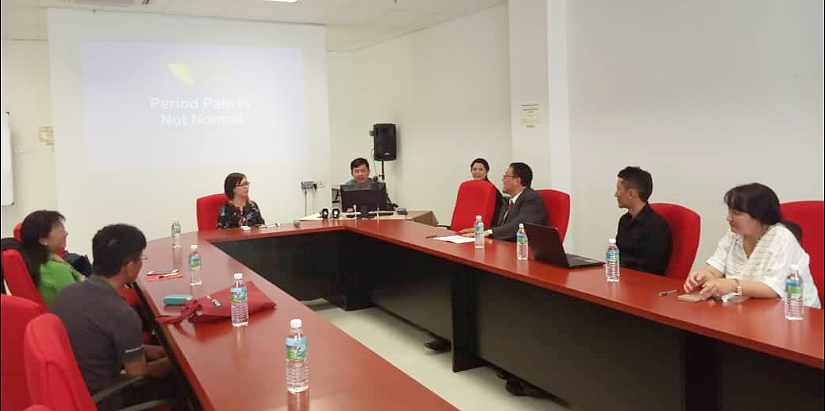
The delegates posing questions to Lim after her presentation
To further allow the delegates to have an overview of university students’ perceptions on reproductive health and awareness, an interactive session with the Second Year Medical students of the Faculty of Medicine and Health Sciences (FMHS) was held. This was then followed by another session which saw the delegates interacting with UTAR students to exchange thoughts and issues commonly faced by Malaysian youths.
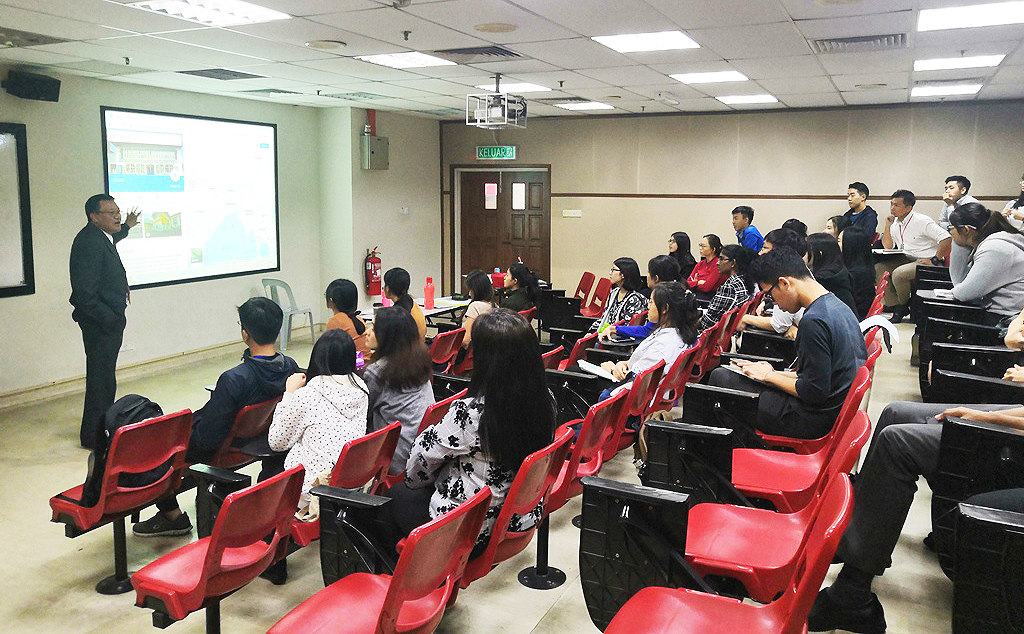
Karma Tshering giving a brief introduction on Bhutan and how the country measures success using the Gross National Happiness (GNH)
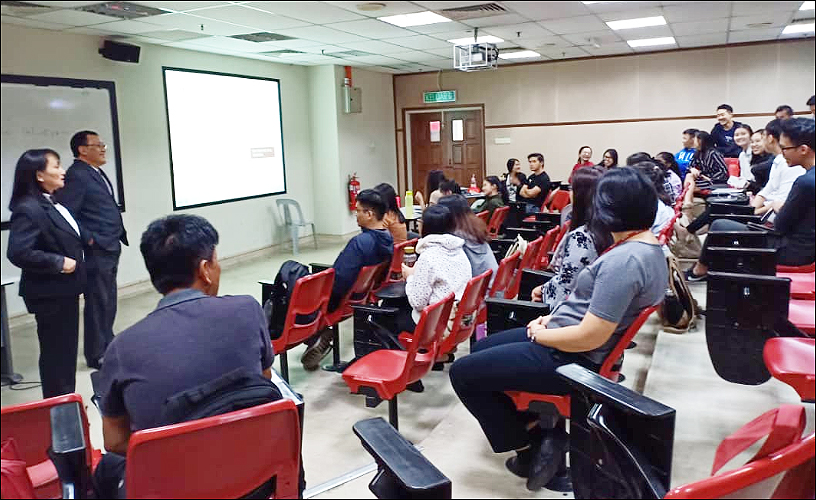
Karma Tshering and Rinzin Wangmo interacting with the FMHS’s second year Medical students to learn about their perception on health awareness
The delegates also made a trip up north on the following day where they were given a tour around the award-winning Kampar Campus by Faculty of Business and Finance (FBF) academics Lau Siew Yee and Lau Wai Kwan. Through a lecture session by Faculty of Arts and Social Science (FAS) Psychology and Counselling lecturer Tan Soon Aun, all delegates also further deepened their understanding on Malaysia’s approach in implementing sexuality and reproductive health education in schools.
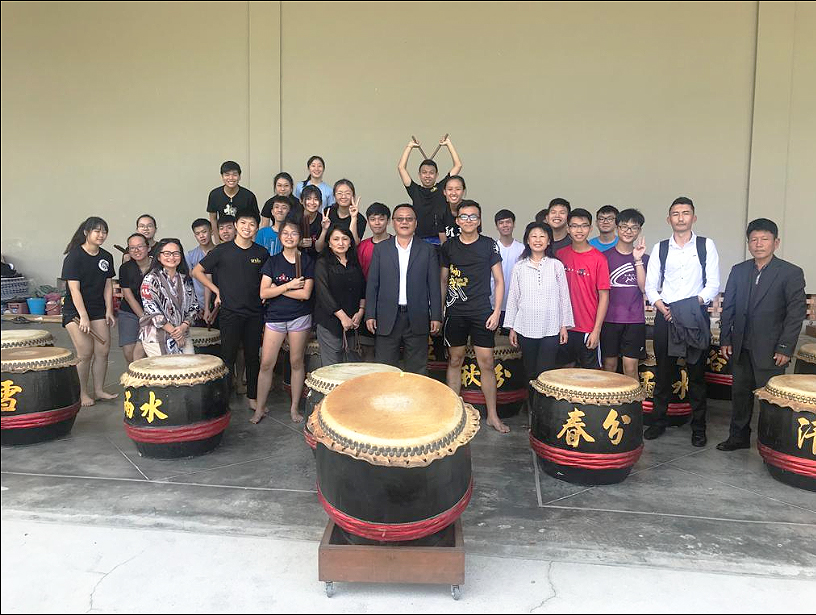
Group photo of the UTAR 24 Festive Season Drum student performers with the delegates at Dewan Tun Dr Ling Liong Sik
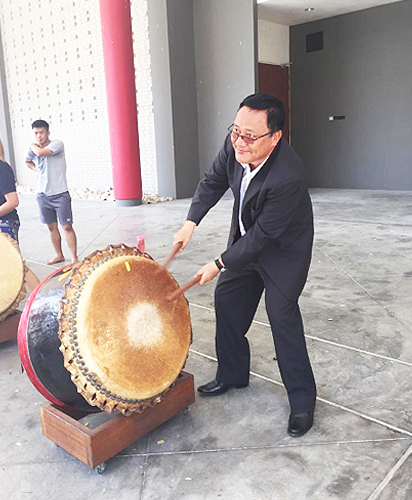
Karma Tshering trying his hands on the 24 Festive Season Drum
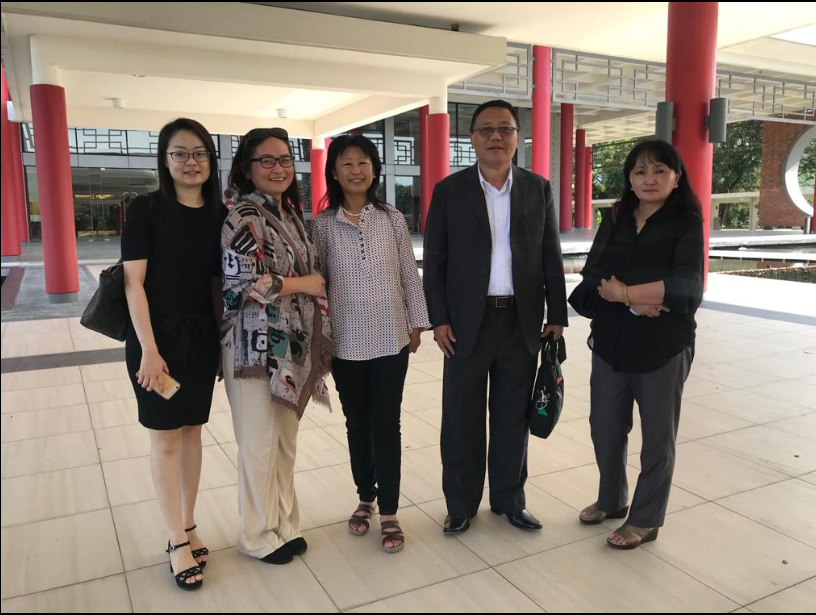
From left: Wai Kwan, Dr Ngeow, Karma Dechen, Karma Tshering, and Rinzin Wangmo
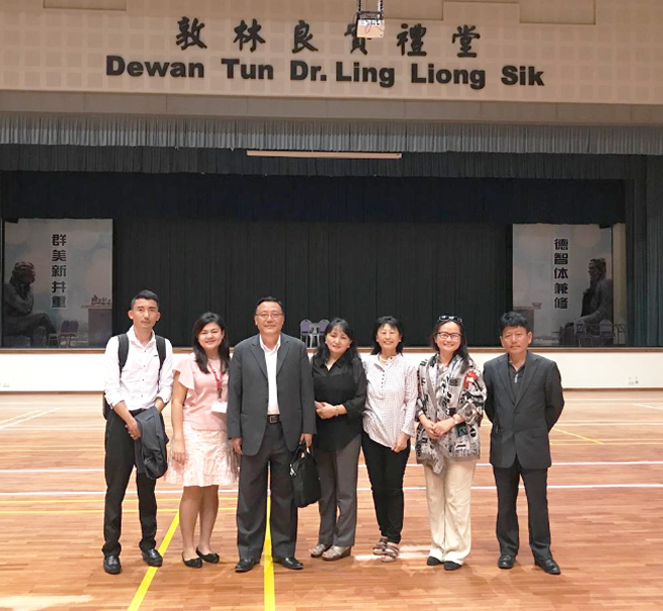
From left: Tandin, Dr Wei, Karma Tshering, Rinzin Wangmo, Karma Dechen, Dr Ngeow, and Dorji Tshewang inside Dewan Tun Dr Ling Liong Sik
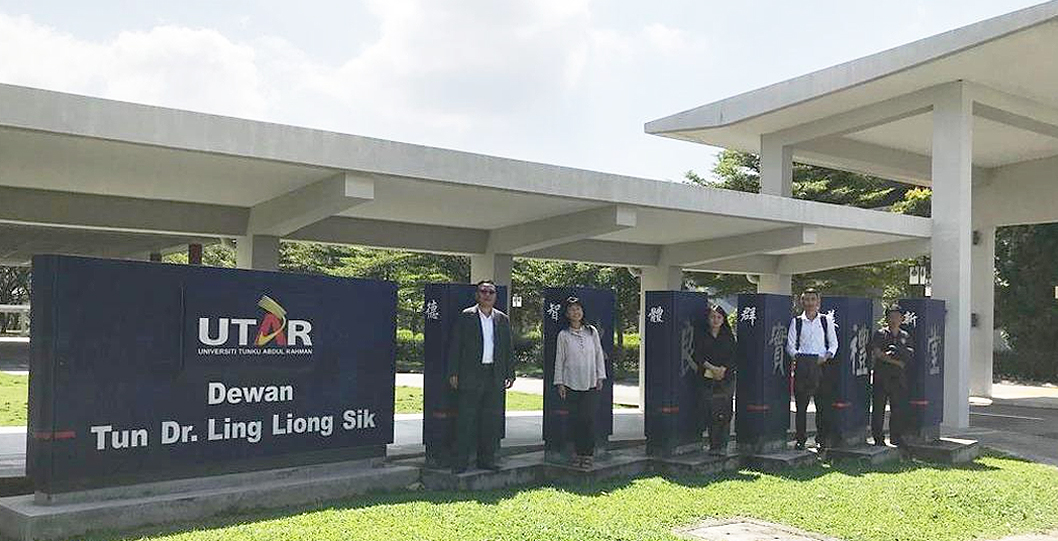
The delegates admiring the architecture of Dewan Tun Dr Ling Liong Sik
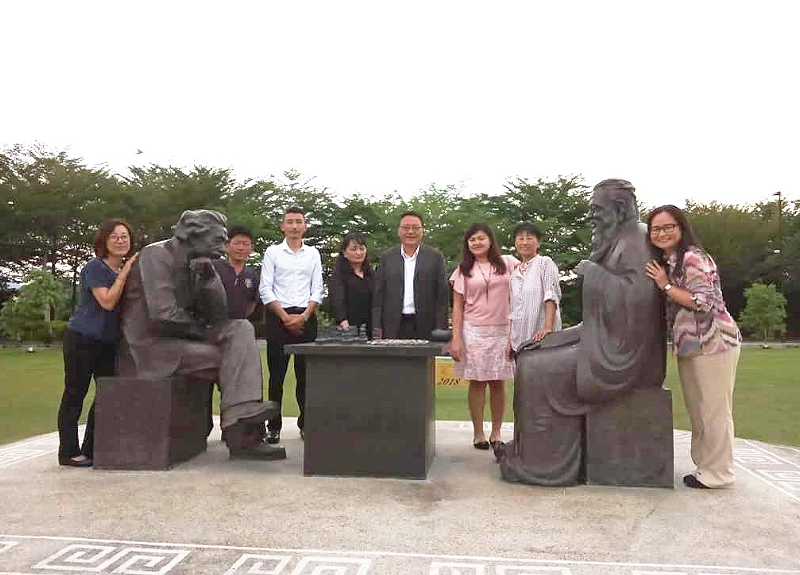
From left: Siew Yee, Dorji Tshewang, Tandin, Rinzin Wangmo, Karma Tshering, Dr Wei, Karma Dechen, and Dr Ngeow taking a photo with the iconic Confucius-Einstein bronze sculptures at Kampar Campus
A researcher in the studies of adolescents’ development, sexuality, cultural values and so on, Tan also highlighted some of the challenges faced in the implementation of such topics in the Malaysian school syllabi. According to Tan, as CSE prepares students to be responsible for the consequences of becoming sexually active, therefore the curriculum should be medically accurate and age appropriate even if it has been customised according to one’s own cultural norms and sensitivities.
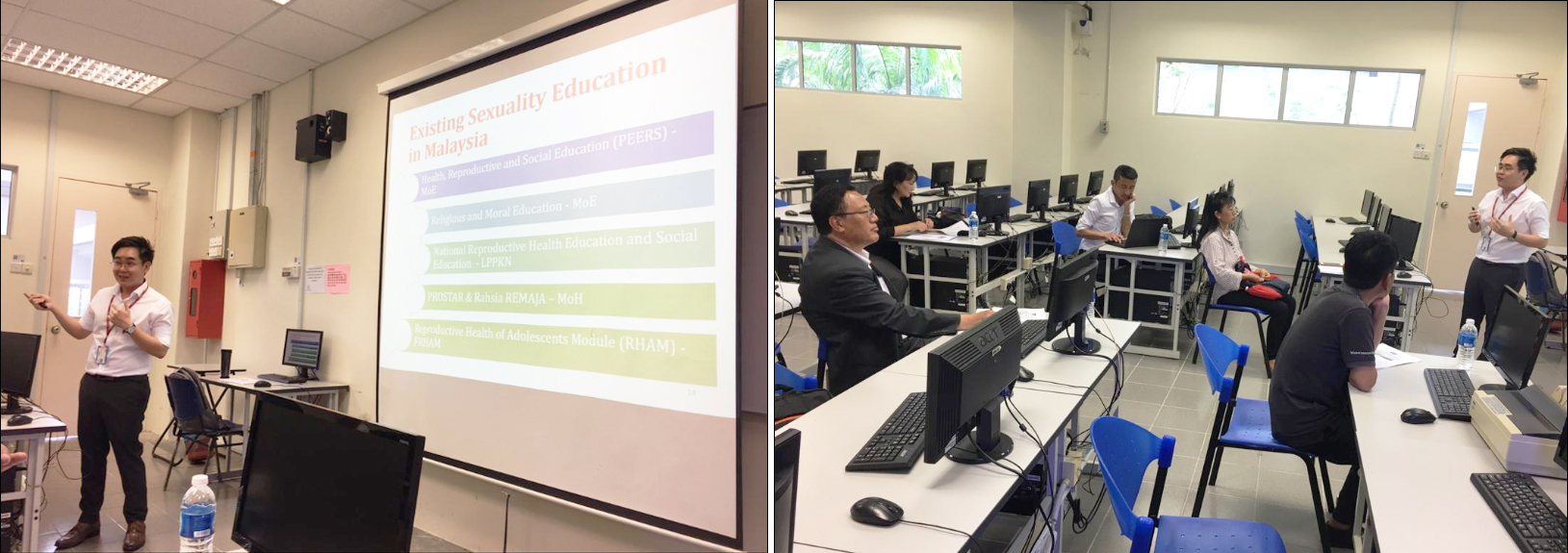
Tan sharing with the delegates his research findings
Head of Department of Soft Skills Competency (DSSC) for Kampar Campus Hee Chwen Yee also gave a succinct presentation of the USSDC certification system as well as DSSC’s diverse community engagement programmes.
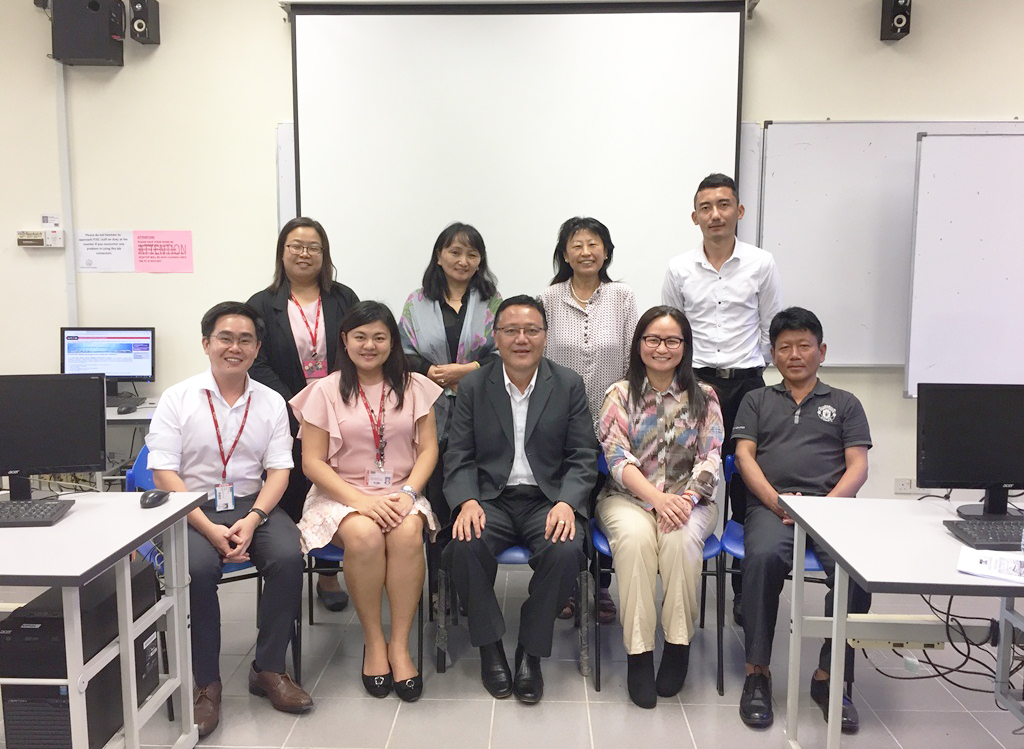
Clockwise from top left: Hee, Rinzin Wangmo, Karma Dechen, Tandin, Dorji Tshewang, Dr Ngeow, Karma Tshering, Dr Wei, and Tan
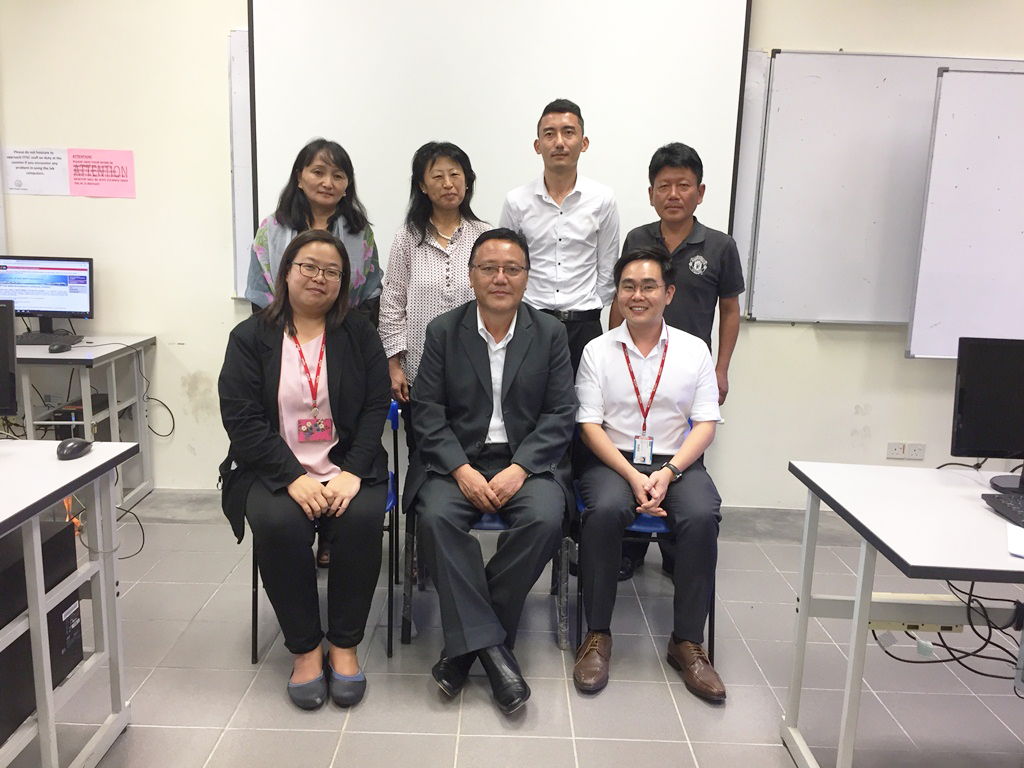
Group photo of the delegates with speakers Tan (seated, most left) and Hee (seated, most right)
While in Kampar, the delegates also took the opportunity to visit Westlake International School (WIS) where they were received by WIS Executive Director Hew Fen Yee, Finance Director Hew Fee Voon, Principal Sherry Ann Daniel, Academic Director Anushia Senthe, and Student Services and Administration Director Sara Wong. The discussion with the school’s management team gave the delegates a glimpse of how an international school which places emphasis on educational excellence and holistic character development is managed. The delegates were equally impressed by WIS’s affordable fee structure which also ensures quality education.
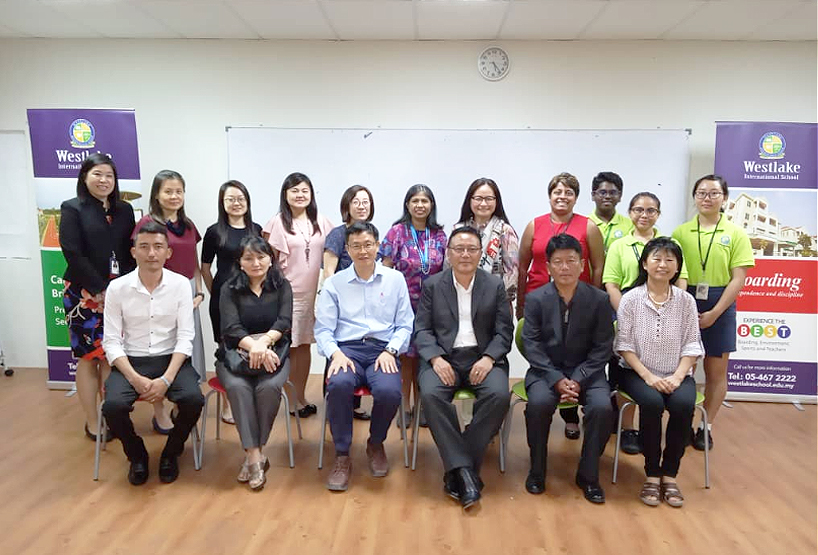
Group photo of the delegates with WIS Executive Director Hew (seated, third from left), the WIS management team and students
With Malaysia being widely known as Asia’s cultural melting pot, the delegates were also keen to learn about how topics such as healthy relationships among peers are being talked about by both religious and non-religious groups as well as youth engagement activities. The places they visited throughout the third day included the International Youth Centre (IYC) in Kuala Lumpur, Buddhist Maha Vihara Malaysia, the National Population and Family Development Board (LPPKN) under the Ministry of Women, Family and Community Development, and the Young Men’s Christian Association (YMCA).
Received by IYC Director Dr Mohamed Maliki bin Mohamed Rapiee, all six delegates learnt about IYC’s various CSE-relevant programmes, activities and awareness campaign on promoting life skills for youths including the ability to build lifelong relationships.
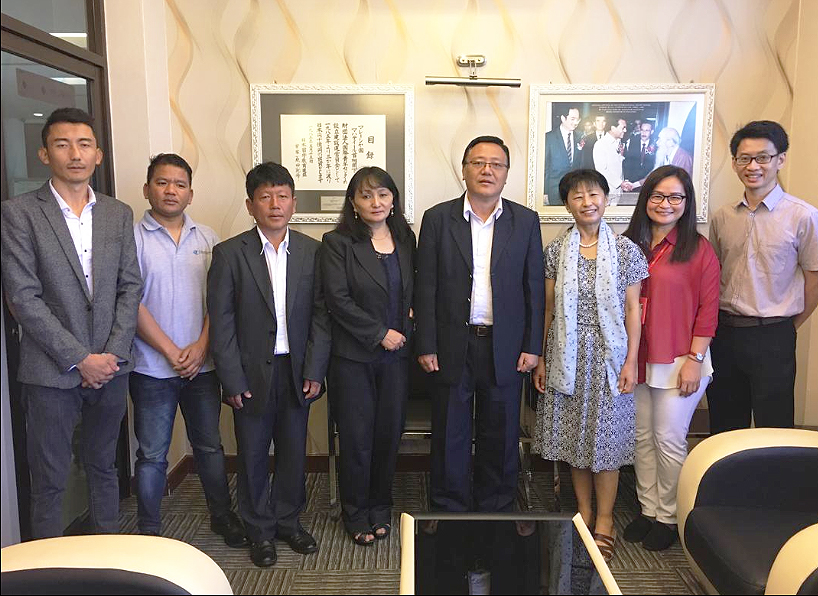
From left: Tandin, Karma Dorji, Dorji Tshewang, Rinzin Wangmo, Karma Tshering, Karma Dechen, Dr Ngeow, and Dr Chen at IYC
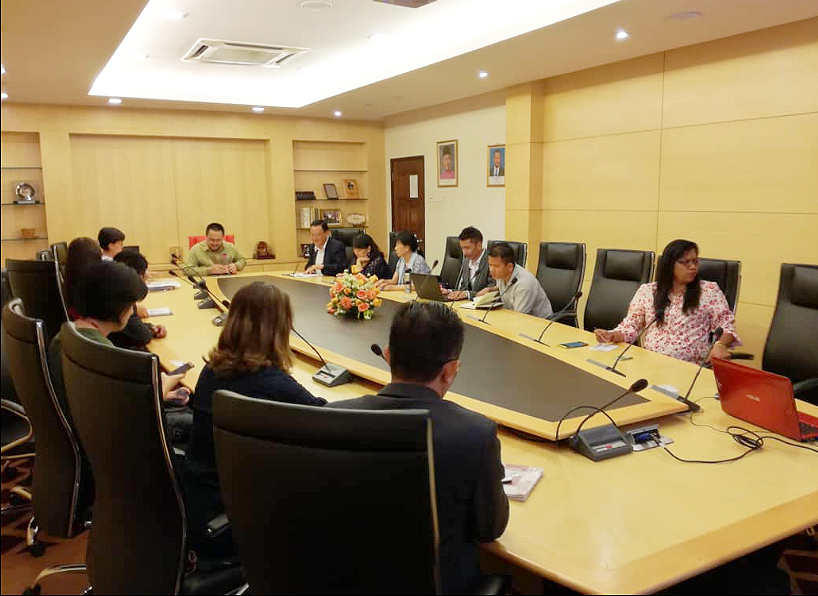
A discussion was held between the delegates and IYC
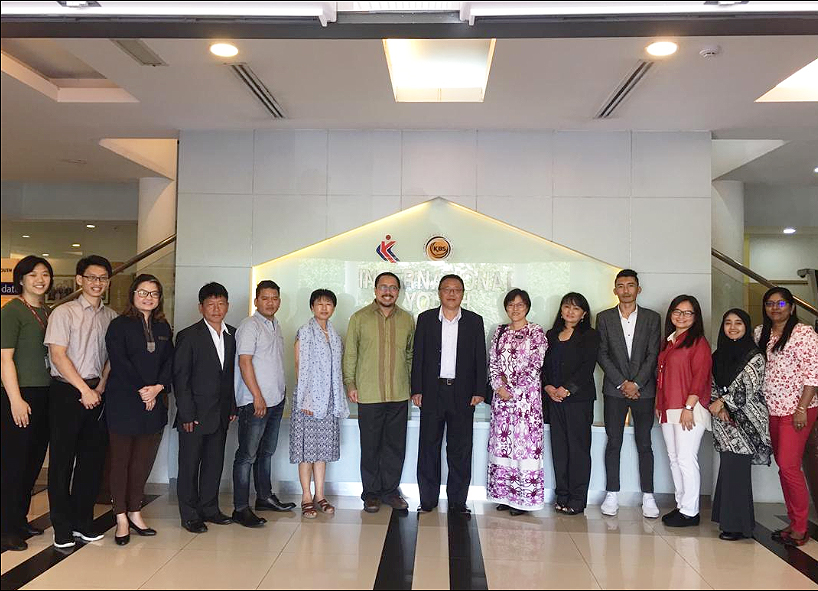
Group photo of the delegates with Dr Maliki (seventh from left) and other IYC staff
A similar topic of discussion was also extended to Buddhist Maha Vihara (BMV) Malaysia but in the context of Theravada Buddhism, one of the major Buddhist traditions found mainly in Sri Lanka and Southeast Asian countries. Through the dialogue sessions with the monks, curriculum developers and advisors of BMV, the delegates were also introduced to BMV’s roadmap as a local Theravada Buddhist organisation in promoting the overall well-being of Malaysian youths.
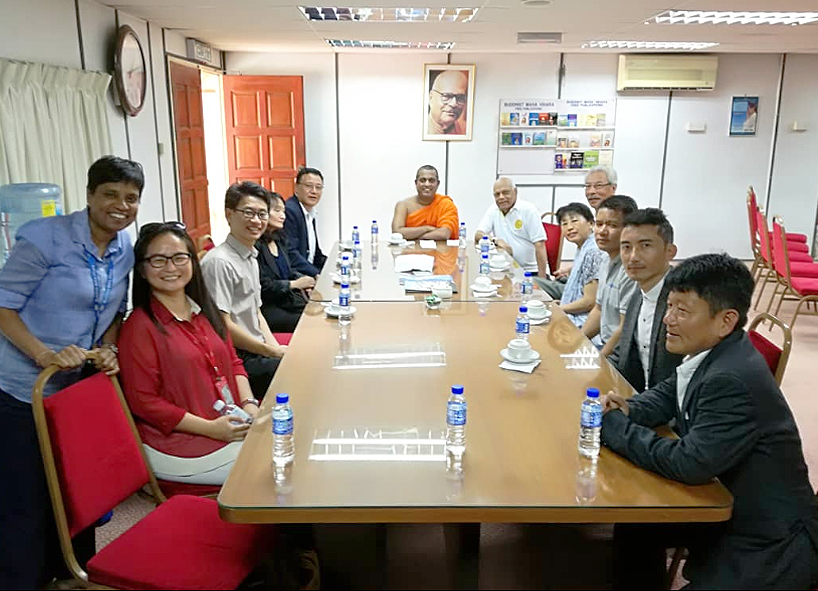
The delegates visiting BMV and were received by the Principal of Buddhist Institute Sunday Dhamma School Venerable K Siridhamma Thera (middle) and some BMV committee members
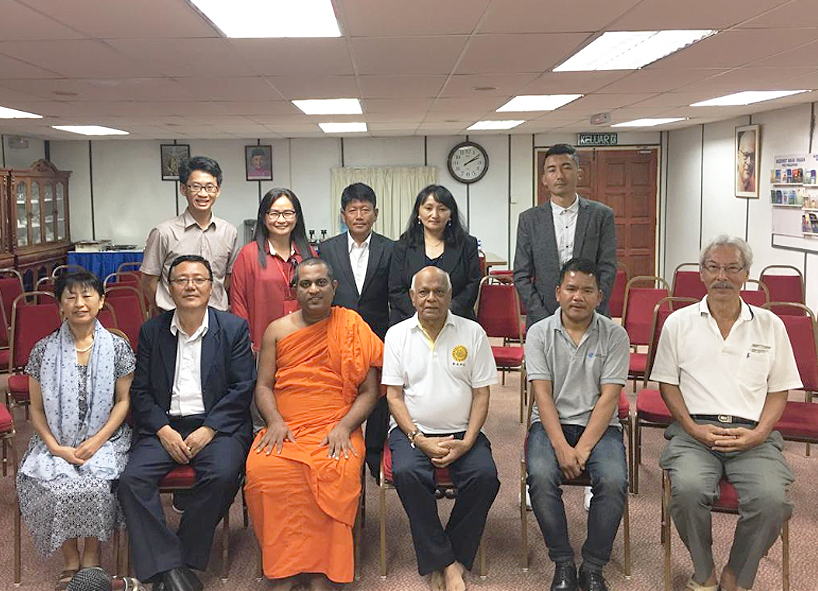
Group photo of the delegates with Venerable K Siridhamma Thera (seated, third from left) and BMV committee members
While at LPPKN, the delegates also learnt about the government’s initiatives in encouraging children and youths to build healthy relationships among peers. Topics such as family planning, contraception, prevention of teenage pregnancy and others were also discussed between the delegates and LPPKN. The delegates also learnt of the many plans in the Board’s pipeline to raise awareness on various teenage social issues.
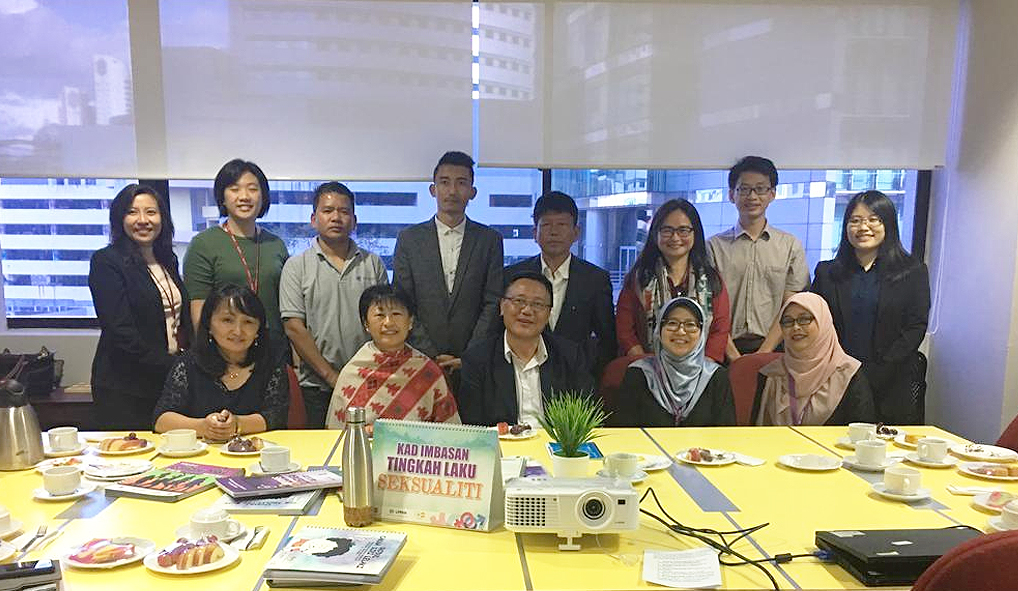
The delegates paying a visit to LPPKN
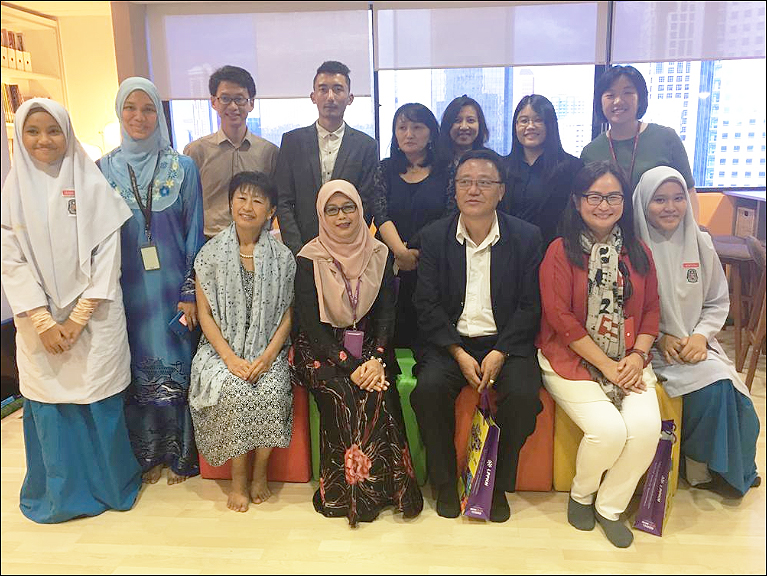
Group photo of the delegates with LPPKN Head of Corporate Communication Unit Rosmonaliza binti Abdul Ghani (seated, fourth from right), LPPKN members and some secondary school students
The last stop of the delegates’ fact-finding expedition for the day, YMCA also shared information on its role in promoting sustainable and healthy relationship among teenagers in line with Christian values. On top of that, the delegates also learnt of the Association’s various recreational and sports activities, sign language courses, Boys’ Brigade and Christian Fellowship activities which are essential in shaping the youths’ positive outlook in life.
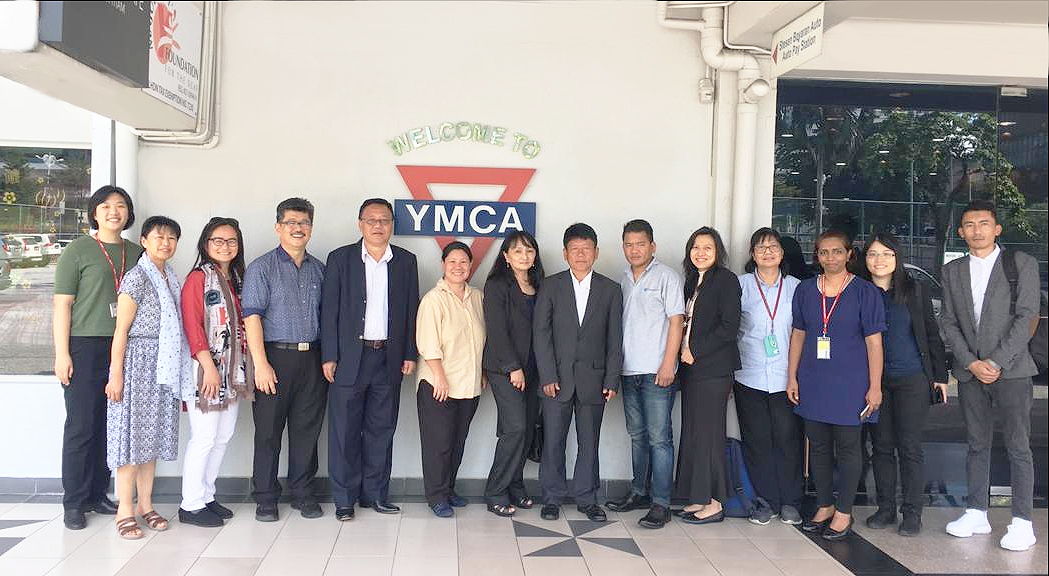
Group photo of the delegates with the YMCA committee members
To reinforce the delegates’ medical knowledge in topics such as sex education, contraceptive and kindred, a presentation session by FMHS Department of Population Medicine’s Dr Foo Chai Nien titled “Public Health Issues, Teenage Pregnancy, Awareness Campaign and Counseling Available for Students and Abused Women and Children” was also held on the last day.
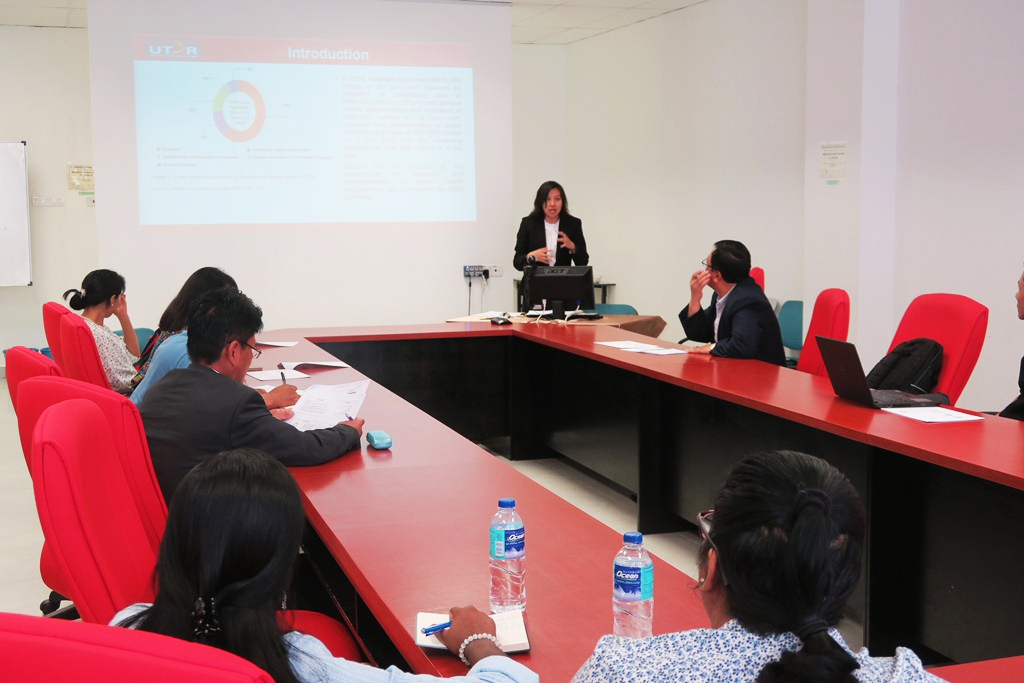
Dr Foo speaking on the topics from the perspective of a medical practitioner
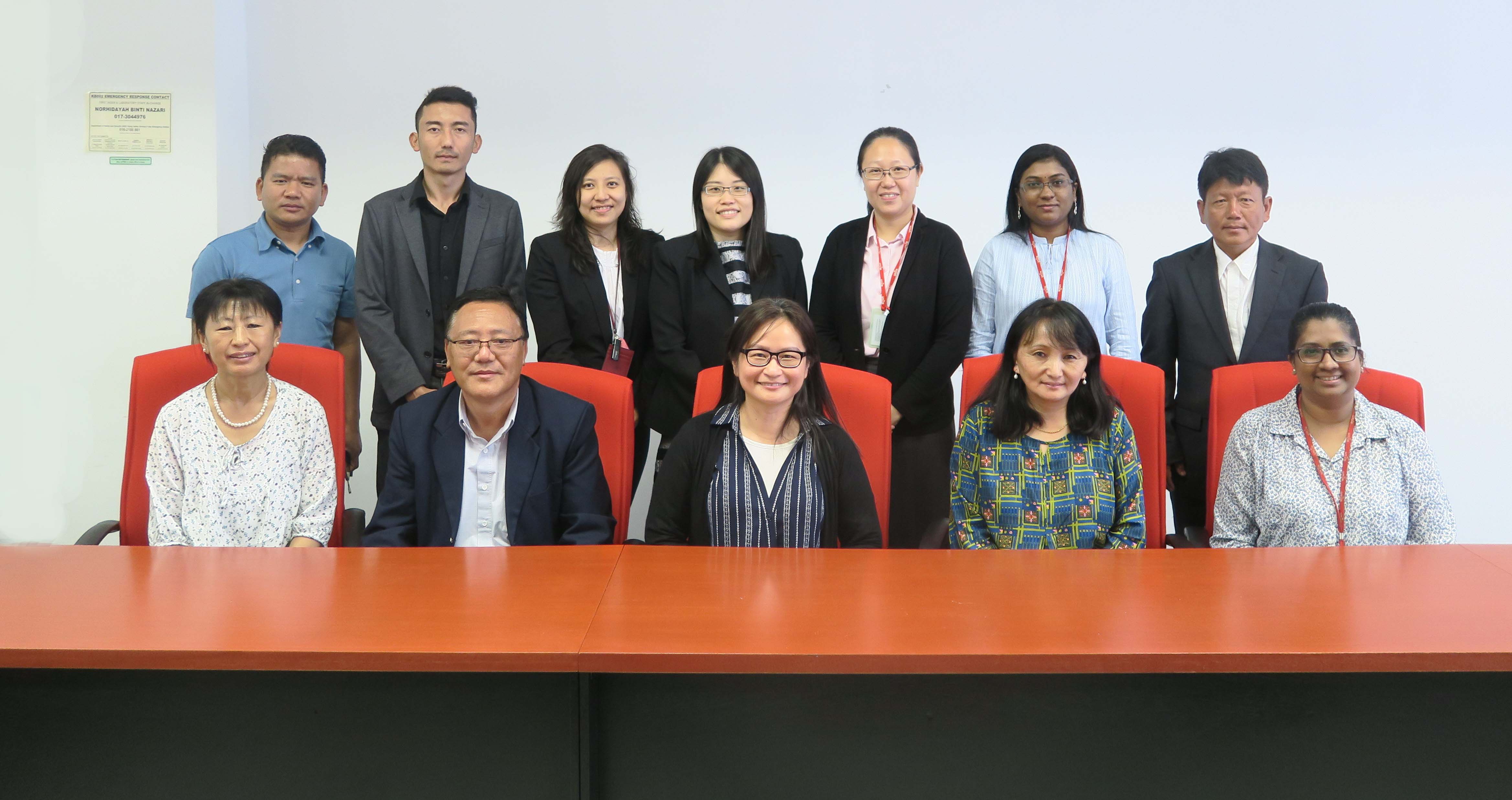
Clockwise from top left: Karma Dorji, Tandin, Dr Foo, FMHS Department of Chinese Medicine’s Dr Ng Foo Leng, Dr Teh Siew Hoon, FCI Department of General Studies’ Brahmmakumari a/p Balaraman, Dorji Tshewang, Geraldine a/p Pangiras, Rinzin Wangmo, Dr Ngeow, Karma Tshering, and Karma Dechen
A brainstorming session was also held on the last day to encapsulate the knowledge gained throughout the exposure tour. According to Karma Tshering, their ultimate aim is to integrate skills and values into the conventional knowledge-based teaching in classrooms. “Values should come first and the rest such as skills and knowledge will follow suit. The importance of skills and knowledge do not supersede the importance of values because the quality of the first two is dependent on the last one,” he mentioned.
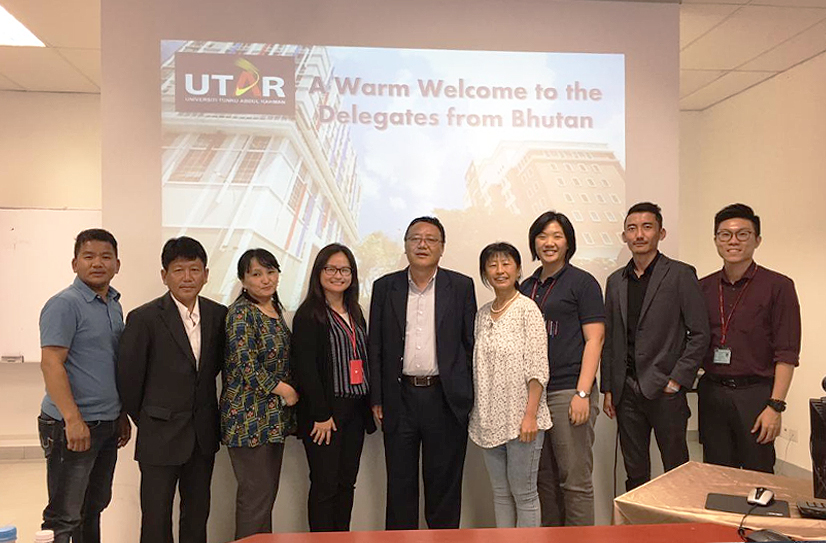
From left: Karma Dorji, Dorji Tshewang, Rinzin Wangmo, Dr Ngeow, Karma Tshering, Karma Dechen, Lee, Tandin and CFS (Sungai Long Campus) Head of Arts and Social Science Department Choon Min Wai after the brainstorming session
Karma Dechen concurred and added that the Ministry does not wish to see the youths not being able to put into practice the knowledge and skills learnt. “As we are reforming the syllabus in order to include life skills, we are also taking this opportunity to integrate sex education as well. Such reforms will see the inclusion of topics such as bullying, sexual harassment, domestic abuse and so on into the our syllabus,” she revealed, adding that the Queen of Bhutan is also playing an active role to raise awareness on the importance of sex education by visiting villages and rural areas.
To Karma Dorji who is a curriculum developer, one of the most useful lessons learnt from the exposure tour was the way to manage issues related to youth, puberty and reproductive health.
Also a curriculum developer and specialist, Dorji Tshewang felt that the topics delivered by the academics were very informative which can also be a very handy guide to develop related curriculum.
“The very first presentation on endometriosis is something new to us,” Tandin told. “The problems faced by the young people in Bhutan are quite similar to those faced by young Malaysians. Therefore, we feel we can always observe some of the programmes or activities carried out here and replicate them in our country to address the issues,” the programme officer continued.
“Bhutan has a very young population. For example, 21 per cent of our population are aged between 13 to 24 years old. As the country is currently at the crossroad of modernisation, we are faced with the onslaught of new developments such as social media boom, growth of consumerism and so on,” said Rinzin Wangmo, further stressing the relevance of CSE education in Bhutan.
The delegates also extended their utmost appreciation to UTAR for the warm hospitality and also the academics for sharing their expertise. Describing UTAR as a big learning centre, Karma Dechen looks forward to carrying exchange programmes with the University in the near future. “We would like to express our gratitude to all those involved in making this exposure tour very educative and interesting,” she said.
On their final thoughts about UTAR and Malaysia, Rinzin Wangmo remarked, “UTAR is a big university with a diverse range of subjects to programmes available. I feel it is therefore befitting for a diverse country like Malaysia. The lecturers whom we interacted with are all humble, knowledgeable and smart. Malaysia is a wonderful country where it is not overly crowded, clean, efficient, and the people are warm. Good luck to UTAR and Malaysia.”
“Malaysia is a beautiful place to live in and UTAR is a place where every young people can make their dreams come true,” Tandin concluded.
In line with the University’s commitment to enhance international standing and community outreach through global and community networking, exposure tours and training programmes as such are regular fixtures at UTAR. To date, the University through its research centres, training centre, as well as institutes have hosted local and international delegates for customised professional development programmes. Such programmes include English Teaching Skills Training Programme by the Centre for Extension Education, Chinese Language Teacher Training Programme by the Institute of Chinese Studies, Principles, Practice, Challenges and Human Capital of Islamic Financial Market by the Institute of Management and Leadership Training, and many more.
© 2019 UNIVERSITI TUNKU ABDUL RAHMAN DU012(A).
Wholly owned by UTAR Education Foundation Co. No. 578227-M LEGAL STATEMENT TERM OF USAGE PRIVACY NOTICE